Thursday, October 22. 6:35 pm. I give a lingering hug to Dora, the lovely Burmese-American woman who sat next to me during my 12 hour flight to Incheon International Airport. She tells me excitedly that I’ll have an amazing experience teaching English in Korea. I respond with my big, toothy smile, validating what I believe to be true.
After picking up my suitcase at baggage claim, I meet Andy, my new Korean-Canadian boss with whom I share mutual friends. I roll my suitcase down into the parking lot and notice something peculiar about the cars.
“Hey, is it just me, or are all the cars in this lot either black or white?”, I ask him.
He doesn’t seem to notice, but I choose to believe this is the first local cultural phenomena I’ve experienced. I put it on the back burner in my mind to relay in a future anecdote about Korea.
I jump in the passenger seat, and marvel at the sight of Songdo as Andy and I drive down the Incheon Grand Bridge, one of the longest cable-stayed bridges in the world. It is slightly reminiscent of the car ride I took from Hong Kong International Airport to Chinese University of Hong Kong in 2007 with a gaggle of other university exchange students who all spoke my language.
What I don’t realize at the time is that working abroad – outside of the more concentrated expat bubble in Seoul, no less – is nothing like living as an exchange student surrounded by a hundred other twenty-somethings who share your affinity for travel, partying, and juking classes that don’t count towards your GPA.
In the weeks that followed my first ride towards Yeonsu (the district in Korea I now call home), I realised that the perfect, easy-breezy experience I envisioned would be a heck of a lot more challenging than my previous foray into Asian living. It would involve such delights as cabbies who couldn’t understand where I needed to go, illiteracy, and copious attention from American military fvckbois. On a more positive note, it would also entail loveable Korean students, a sweet co-worker who offered me friendship and translation, and supportive employers who are also fun to drink with.
It’s tough to sum up the mosaic of emotions, experiences and observations – both big and small – from my first month in Korea.
Here’s what stood out to me the most.
Loneliness hits you in rogue waves.
Loneliness is not a feeling or experience I’m too familiar with. I’ve always had a boyfriend /guy I’m dating, my best friends, dozens of other friends and nearly all my family members within reach. None of those people are here with me in Korea.
Don’t get me wrong; I’ve made some friends (and yes, I’ve let my Tinder matches regale me with uncreative pick up lines for mild entertainment purposes). But none of my best friends are here. I’ve yet to develop that level of friendship with people that I’ve met where I can be truly crass, honest, vulnerable, weepy in desperate times, and swear like a sailor without feeling like I’m “too much”. Life really can’t be much greener on the other side of the world if your best friends aren’t there with you.
Having said all that, I’m finally starting to get more of a handle on homesickness now that I’ve had the chance to meet many more people – Korean and foreigner alike.
And my Tinder account is on its 11th way to deletion. Well, its 12th way after it bores me again in a few weeks.
If you don’t want to drain your savings on coffee, avoid Starbucks.
I can say with confidence that coffee may be more widely available in Korea than water, and though we all love Grande Skinny Vanilla Soy Lattes (and by all, I mean me), it might be worth switching out Starbucks for a more affordable local brand. With Korea ranked the sixth most expensive Starbucks location in the world, I spent upwards of 7/8$ on Americanos every day the first few weeks after my arrival. Do yourself a favour and try switching to instant coffee (some varieties really aren’t that terrible), or any other variety of coffee shops around town (there are countless other brands). A quick heads up that Tom N Toms, Korea’s nearly identical response to Starbucks, isn’t much cheaper.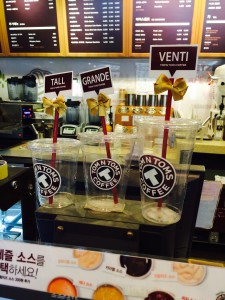
In Korea, you can leave your umbrella at the door, simply tell the bartender how much you owe at the end of the night, leave your phone/ wallet/ bag unsupervised, and walk at night without fear.
Imagine a utopian society where people respect your belongings, trust you with their unsupervised valuables and are likely to be trustworthy themselves. Korea kinda feels like that most of the time.
A few weeks ago, my co-workers and I hit up an “American” buffet called Ashley for brunch in Yeonsu. In Montreal, someone usually stays at the table while the others grab their grub, or they bring their purses and cell phones with them when they hit up the buffet tables – and with good reason (I ‘ve had two iPhones stolen in Montreal in the past year alone). As the others headed to the buffet, I volunteered to stay at the table to watch our bags. My co-worker Theresa looked over at me and chuckled. “You don’t need to worry about that here,” she said.
In the weeks that followed, I noticed that umbrella racks were available at the front of nearly every establishment. People left their umbrellas with complete confidence. I was baffled.
I walked Theresa’s dog every night around 11 pm for a week while she was away. There were drunken stragglers lurching about, and yet I still felt pretty safe.
Most recently, I attended an event at a crowded bar. The bartender simply told us to grab our own drinks from the fridge and let him know much we owed him at the end of the night.
Mindblowing.
Korea’s obsession with beauty is overwhelming.
The entire world has an obsession with both male and female beauty, to be sure – but Korea takes this obsession to an otherworldly level. Plastic surgery here is cheap and accessible, with over 1 in 4 Korean women going under the knife in their lifetime. I see this prominent cultural value reflected in my own students every day, with kids as young as seven casually throwing words like “ugly”, “fat” and “plain” around in reference to fellow students and teachers alike.
And there are countless other examples:
- My headshot at the hagwon (private academy) I teach at was photoshopped to eliminate all my freckles, adjust my nose and eyebrows and even tint my hair. It doesn’t look like me at all, but my students praised it as “very, very pretty”.
- A few weeks ago, my landlady told me I should visit her at her beauty salon to eliminate/ reduce my freckles. I could tell freckles weren’t her thing when she literally made a barfy face while gesturing towards my skin.
- Last week, I decided to throw my hair up in a clip, but my female students wouldn’t have it. Before class began, they hurriedly ran over to me, grabbed the clip from my hair and said very matter-of-factly, “Teacher, we wear our hair like this,” gesturing to their perfectly coiffed hair worn down around their shoulders.
- A few weeks ago, my gorgeous, beyond intelligent 12 year old student opted to eat only half her Kinder Surprise because she found out it contained 100 calories.
- My students visibly snobbed one of my co-workers on the one day she decided not to wear any makeup (and she doesn’t require much, if any, to look beautiful, IMO).
The list goes on.
I’ve been called everything from “so so beautiful” and “Angelina Jolie” to “ugly” and “1000 pounds” , so I’m not too sure where I rank on the beauty scale by Korean standards. Regardless, I admit that I’m a little more self-conscious about walking out the door with chipped nail polish these days.
If you’re a teacher, you will fall madly in love with your students.
I suppose this might be different depending on your experience, but in only a few short weeks, I’ve already become attached to the students who call me Stephanie Teacher . I knew I’d enjoy my new gig working with kids, but words can’t really describe the bond I already feel with them.
One of my students, Chan Eun, never leaves home without a Rubix cube and can solve them in less than a minute. Jung Eun dreams of being an Olympic swimmer, and her awe-inspiring work ethic involves 5 am wake-up times, volunteering on weekends and studying at school until 10 pm. A group of younger students call me Vanilla, which is kinda racist but somehow endearing (I mean, let’s face it – everyone loves vanilla, anyway). I have countless anecdotes about all the kids I teach. I love them dearly and feel privileged to know them. I already know it will be difficult to leave them in a year.
Unless you live in Seoul or on an American military base, it will be very difficult to get by without speaking Korean. DO NOT LISTEN TO THE PEOPLE WHO TELL YOU OTHERWISE.
I sure wish I hadn’t listened to the people who told me ( and still tell me!) I’d be “fine” without Korean and I could “pick it up easily”. I was a fool. I learned the hard way.
I could kick myself for not having studied Korean BEFORE ARRIVING IN KOREA. There isn’t a day that goes by where I don’t feel like a seemingly privileged, self-entitled basic Western idiot. To put it bluntly, I feel like an asshole. All the time.
I’ll never forget my first attempt to do groceries. Accustomed to grocery stores being – just, well, grocery stores – I walked into the local department-store sized supermarket, Lotte Mart, with no groceries to be found. I figured the grocery “department” might be on one of the six floors. It took me about ten minutes of wandering before I found that floor. I walked through the aisles, and gingerly picked up things I recognized. There were no English labels. That might not seem like a big deal when you’re looking for eggs – but it can be if you’re looking for items with instructions you can read. Or dumplings with ingredients you can read (sidenote: I’m a vegetarian).
Once I was done with my pitiful, risk-averse collection of grocery items – instant rice, sriracha sauce, a ton of mystery noodles (what could go wrong?) and Diet Coke – I was ready to go to the checkout…except I had no idea where the checkout was. Like a wandering idiot, I searched aimlessly and desperately for a cashier. I wandered over sheepishly to the woman in the bakery section. I took out my wallet, pointed at it and made a quizzical face. She gave me a smile (probably embarrassed for me), and pointed upwards with a confused look on her face. I hoped she was referring to the checkout, and not to a floor where they sold wallets. I made my way upstairs, and eventually found my way to the checkout. The checkout also happens to be the only place where you can purchase the city-ordained garbage bags, so I asked her for one. She gave me a big paper bag to put my groceries in. Repeating the words “other bag” to her didn’t work. I’m a decorated scholar, and yet I couldn’t successfully purchase a garbage bag.
I returned home and asked my co-worker to borrow her Korean books.
The moral of the story is this: if you plan to work or live in Korea, PLEASE do not listen to all the people (likely Seoul expats) who will tell you “you don’t really need to learn Korean”. I am SHOCKED to this day how many people told me – and STILL tell me – that you don’t need it to get by in this country. Put your big girl and big boy panties on and LEARN THE LANGUAGE. You will appear like less of a douche AND it will make your life a ton easier.
WIN/ WIN!
While travel opportunities are abundant, they can still be pricey.
With 100$ roundtrip flights to Japan, high speed rail service through Korea and budget airlines like Air Asia, long weekends to the destinations of your dreams are affordable, accessible and aplenty. That said, flights to warmer, more southern locations like Thailand might cost you the same as a round trip ticket home (I paid nearly 1000$ for a RT ticket to Bali). This would be logical given the distance of many of these countries, but I certainly had unrealistic expectations of the cheap flight options available. I might have to keep most of my travels local this year so I don’t break the bank.
Being a visible minority is jarring and isolating.
Though I’ve already lived in Asia, living within the confines of the FES community in Hong Kong with my other (mostly) white friends didn’t really provide me with the experience of living as a true visible minority. In Yeonsu-dong, I marvel when I see anyone who isn’t Korean. I am usually the only non-Asian person in a store, the street, or the bus (aside from my co-worker, who if often with me). It is a humbling experience, and one I truly think everyone ought to go through once in their life. It is also an isolating experience, and one which makes you truly empathetic to the experiences of other minorities in your home country.
The biggest expat party/food/restaurant districts are Itaewon and Hongdae. Both are located in Seoul.
My first trek to Itaewon was so joyous, it could only be experienced sporadically or I’d blow all my cash on food, drink, clothes and partying. When I got off the subway at Naksapyeong Station a few weeks ago, I literally emerged bug-eyed as I ogled the foreigners who crossed my path. I feared I must have looked like a crazy person as I unconsciously flashed them “hello non-Asian compadre” smiles.
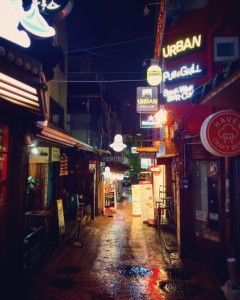
My friends and I eventually made our way to Vatos, a Mexican restaurant chock-full of foreigners. “Hotline Bling” was playing. Vegan burritos were available on the menu. The server spoke English (in fact, he wasn’t even Korean). I ordered a Makgeollirita, and felt guilty and uncultured to admit that I preferred it over traditional makgeolli.
The rest of our Sunday Funday consisted of poutine, Australian wine and chocolate chip cookies. It was wonderful and comforting, but I knew it was a daily expat lifestyle I had grown out of. I was no longer the 22 year old party girl dominating the bar scene in the foreigner mecca of LKF in Hong Kong. I returned home to Yeonsu, satisified knowing how close Seoul was if I needed some of the comforts of home, and yet somehow grateful to be far enough to immerse myself in a more local experience.
Soju is really cheap and gets you drunk. Fast.
The most popular drink here is soju, which has an average of 20% ABV and costs anywhere between 1-3$ a bottle. My first soju experience went a little like this:
Me: I have a realllllyyy high tolerance.
Sky, the American fighter pilot: Ha ha ha…
Me: Omg like this isn’t strong at all.
Sky: Ha ha ha…
Me: I seriously don’t get what the big deal is. Let’s get another bottle!
Sky: Ha ha ha…
1 hour later
Next day
Fortunately, my second soju experience far outweighed my novice attempt: the pojang-macha – or what we colloquially refer to here as a soju tent. These illegal tents set up around town are where people gather around hot pots and play soju drinking games. My bosses brought me out to one my second weekend in Korea, and by this time, I was prepared for the sneak attack of white girl drunkenness I knew the soju might bring.
Needless to say, I’m a little more prepared now. And I’ve got two bottles ready in my fridge.
On a more serious note, alcoholism is a visible, ubiquitous problem here.
Thanks to the aforementioned accessibility of soju, I nary walk out my door without seeing someone who is fall-down drunk. By early evening, you can easily find people passed out on tables, teetering down the streets, and puking on sidewalks. Just last week, a man passed out on my shoulder on the subway. Later that evening, a girl next to me blacked out on the subway stairs.
Koreans are the biggest consumers of hard liquor in the world, with the average Korean downing over 13 shots a week. What’s more, it’s considered impolite to refuse alcohol if someone offers it to you, further reinforcing the prevalence of alcoholism.
Now don’t get me wrong. I enjoy drinking and have been drunk more times than I care to admit. But when you’re constantly inundated with the sight of alcohol abuse, social drinking loses its allure. After a month of seeing the ugly side of drinking, I’ve become a much bigger fan of sobriety.
There is no actual word for “vegetarian” in Korean – let alone “vegan”.
People warned me that it would be impossible for me to maintain a vegan diet in Korea, but I laughed off their warnings. I was told the same thing living in Montreal, but I knew there was always something on a menu I could order.
I was a fool.
There is no actual word for vegetarian in Korea. There is meat. In. Everything.
There is meat in every noodle dish, every sandwich, every croissant, and every salad.
My first week in Korea, I found out that the kimchi ramen noodles I had been eating twice daily had pork in it (where and in what form, I still have no idea). I switched to the Veggie Delite at Subways.
Nowadays, I have discovered a couple more vegetarian/ pescatarian dishes, such as bap burger (rice burger), the cold noodle bowl option at the Korean barbecue (called naengmyeon), vegetarian bibimbap, and tteokbokki (spicy rice cake). A vegan lifestyle has proven to be extremely trying, but I do my best. There are only so many Veggie Delites I can stomach.
I’m illiterate.(Update: finally getting a handle on Hangeul!)
We used to speak about the issue of illiteracy in my international development classes in grad school, but since I learned to read at the tender age of three, it was never really a relatable issue…until now. Up until a few weeks ago, I wasn’t able to read anything. Ever. Imagine going to a store, the subway, or a restaurant and not being able to read anything at all. It is a beyond frustrating, yet humbling experience. The ability to read is something most of us take for granted. After I had about enough of being an illiterate 30 year old, I found this AMAZING web comic created by Ryan Estrada called How to Read Korean in 15 Minutes. Imagine how silly I felt when I found out the truth: Hanguel is one of the simplest alphabets in the world, invented by King Sejong the Great in 1443 to help Koreans learn, speak and read easily, thus promoting literacy. Today, UNESCO awards the King Sejong Literacy Prize to a person or organization dedicated to the elimination of illiteracy every year on October 9th, which is Hangeul Day. Now if I could only understand what I’m reading…
Bathrooms are like one giant shower with a big drain in the middle (mine is, anyway).
If you live in a standard apartment, the bathroom floor and your shower floor are one and the same. In other words, changing into fresh clothes in your bathroom is not an option, as they will inevitably fall onto your wet floor. Shower shoes are big here ( and mine are hot pink, of course).
They’ve got an addictive fruit jelly you plop into hot water to make tea.
Yujacheong – sliced yuja (citrus fruit) preserved in marmalade – is my go-to at night when I work on my blog. I don’t foresee myself buying tea bags as long as this stuff exists.
No matter how hard it is to envision building a new circle of friends, it inevitably occurs and life will start to seem normal again.
One of the most rewarding experiences so far has been meeting people from Korea and abroad alike. Every day, I meet someone new or share a laugh with my co-worker, and I slowly adjust that much more to my new life. It’s usually the people that make your experiences most memorable, and I am excited and hopeful thinking of the memories to come with the new connections I’ll make this year.
To conclude…
Having just passed my one month mark living in Korea, I am filled with mixed emotions. I am often overwhelmed, and I’m constantly cramming new information into my brain at a mind numbing rate.
But one thing is for certain: I have no regrets.
Vanilla is here to stay.
Have you ever moved to a different country? Share your love or haterade below!

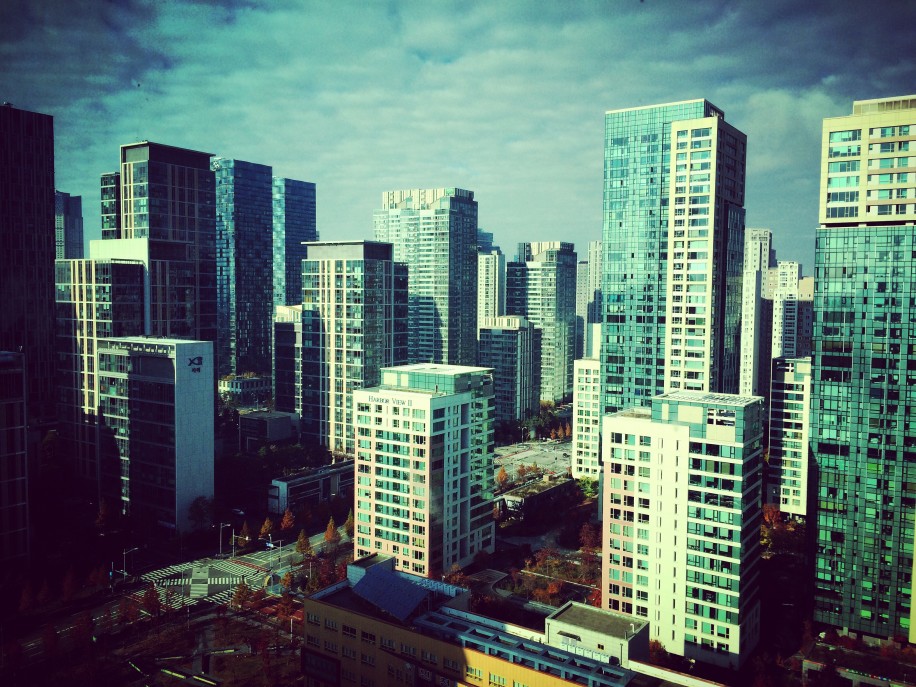
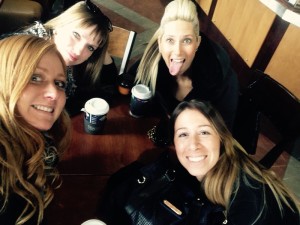
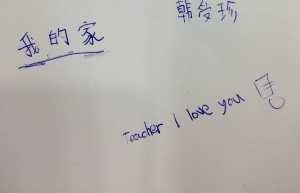

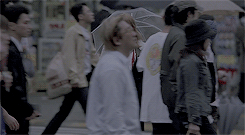


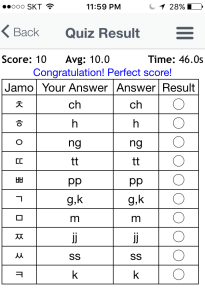
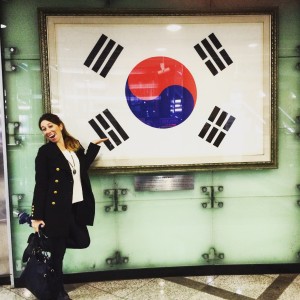
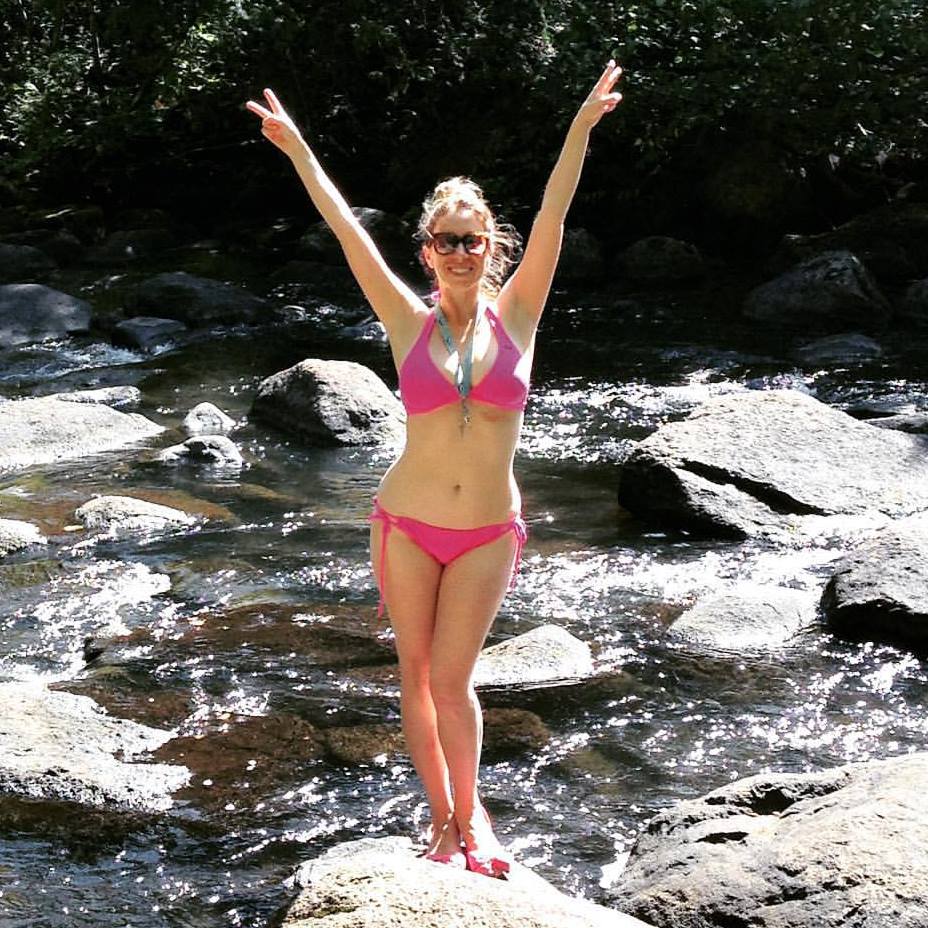

Nir "whiter than vanilla" December 1, 2015 at 1:25 pm
Loved reading this post Steph!!! Amazing!! Keep it up girl!! Looking forward to the next one
Stephanie December 1, 2015 at 11:19 pm
Haha! Whiter than vanilla lolz! Thank you homeboi – I really appreciate the love and support! xoxo
Melanie C. December 1, 2015 at 8:46 pm
Salut Steph,
I red it all. Love your writing. Merci de me faire voyager.
Stephanie December 1, 2015 at 11:19 pm
Melanie!! Thank you so much for reading my article et merci pour tes commentaires 🙂 Tu me manques! xo
Nancy December 5, 2015 at 12:23 am
Stephanie!! This was such a great post!! I read every single word and then read it again out loud to my daughter. We laughed and it was a very magical moment between the two of us as she shared her dreams of travelling one day. Thank you!!
Stephanie December 6, 2015 at 3:23 pm
Nancy! Thank you for checking out my post – I’m so happy it brought a few laughs and inspiration to you and your lovely daughter <3 Your support means so much. All my love to you and your family!